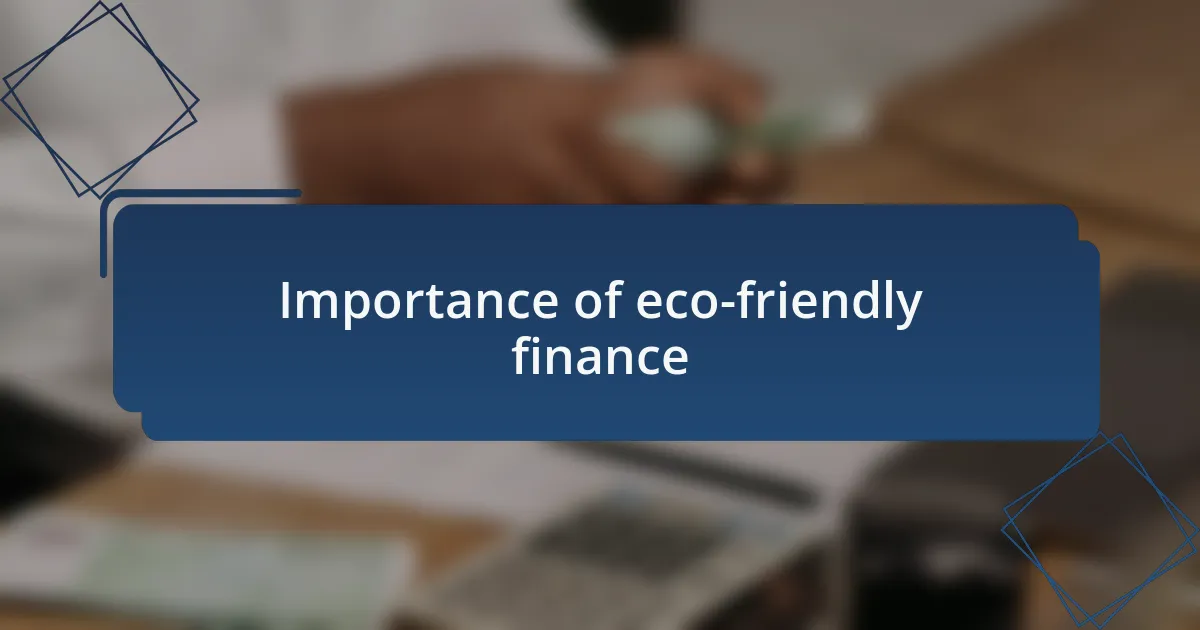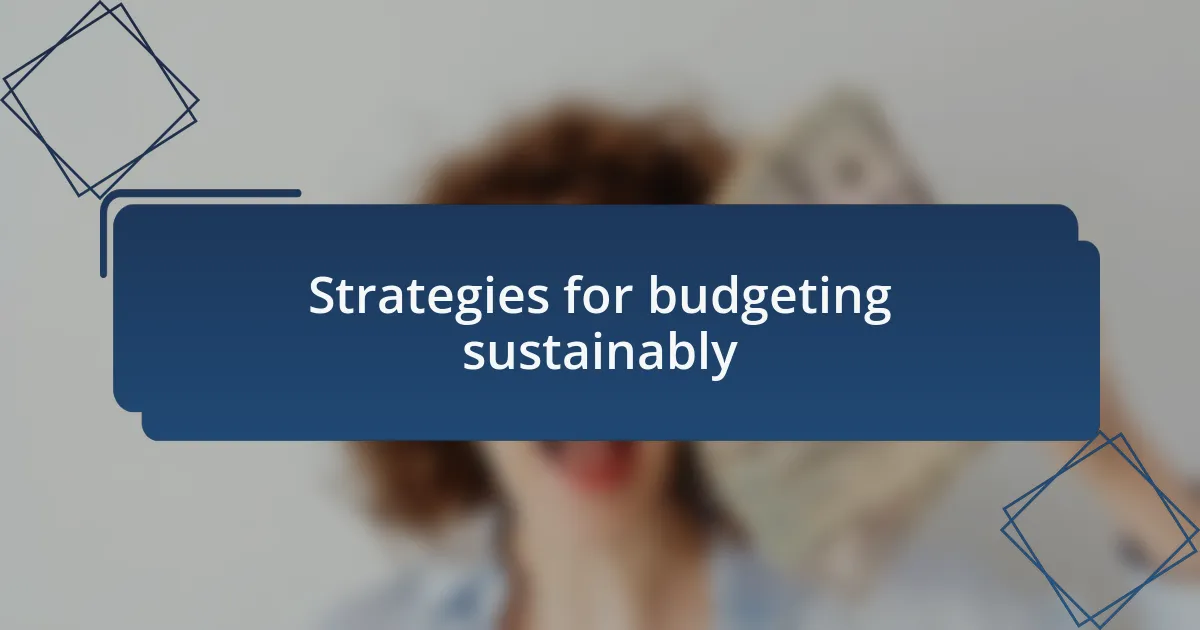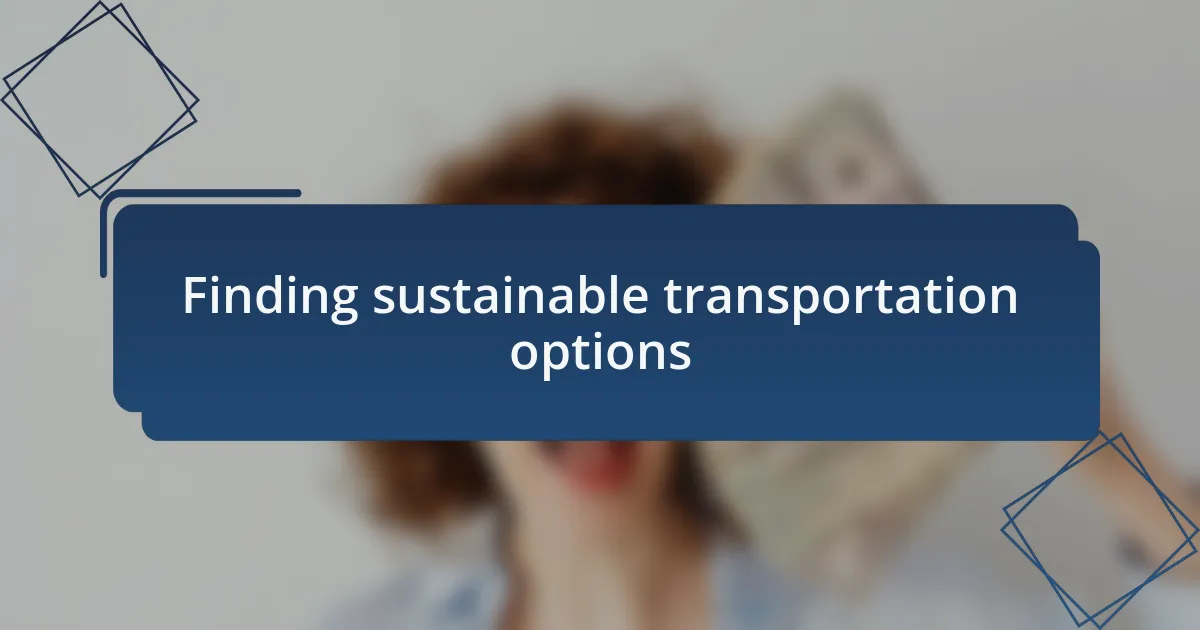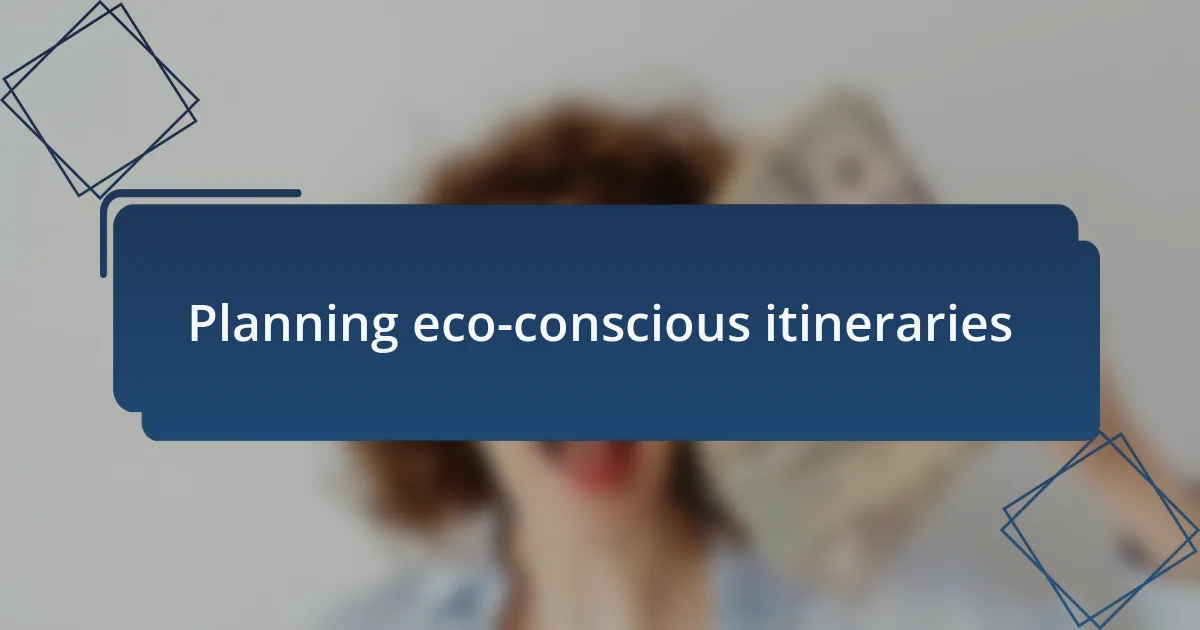Key takeaways:
- Sustainable travel encompasses supporting local economies, minimizing environmental impact, and fostering meaningful interactions with communities.
- Eco-friendly finance, such as choosing sustainable transportation and lodging, plays a crucial role in promoting responsible travel practices.
- Planning eco-conscious itineraries can enhance travel experiences through local interactions, conservation activities, and supporting local agriculture.
- Personal travel experiences highlight the importance of connection, shared goals, and the impact on local communities and the environment.

Understanding sustainable travel
Sustainable travel is not just about visiting eco-friendly destinations; it’s a mindset that seeks to minimize the environmental impact of our journeys. I remember my trip to Costa Rica, where I chose to stay in a small, locally-owned lodge instead of a big resort. The personal connections I made there were invaluable, illustrating how nurturing local economies can enrich our travel experiences while promoting sustainability.
When I think about sustainable travel, I often ask myself how my choices affect the planet and the communities I visit. For instance, during a recent hike in the mountains, I was struck by the pristine beauty of nature, but I couldn’t help but notice the litter along the trail. It made me realize that our travel habits can either contribute to the degradation or preservation of these stunning environments. Every small action, like carrying out what we bring in, matters immensely.
To me, sustainable travel means embracing practices that support nature and local cultures. Engaging with indigenous practices, like participating in a permaculture workshop or learning traditional cooking methods, not only deepens our understanding of the places we visit but also honors the cultural heritage of the communities. This approach transforms my travels into meaningful exchanges instead of just trips, highlighting the importance of being responsible stewards of the places we explore.

Importance of eco-friendly finance
Eco-friendly finance plays a crucial role in promoting sustainable travel. I recall a time when I opted for eco-friendly transportation, such as taking a train instead of flying. By consciously choosing options that reduce my carbon footprint, I realized I was not only saving money but also contributing to a larger movement toward responsible travel practices. Isn’t it empowering to think that our financial choices can directly influence the environmental impact of our journeys?
Moreover, supporting businesses that prioritize sustainability strengthens local economies. When I visited a town that thrived on eco-tourism, I made a point to spend at local markets and stay at eco-conscious hotels. This experience made me feel connected to the community, knowing that my financial decisions were helping preserve their environment and culture. Isn’t it incredible how each dollar spent can echo in the local ecosystem?
Lastly, eco-friendly finance is essential for fostering innovation in sustainable travel solutions. I remember discovering startups that focus on environmentally friendly accommodations and transport options. These innovative ideas not only cater to eco-conscious travelers but also encourage larger companies to adapt or risk losing clientele. Doesn’t it excite you to think that your travel choices can drive change in the industry?

Strategies for budgeting sustainably
When it comes to budgeting sustainably, I’ve found that tracking expenses in an eco-conscious way can truly elevate the experience. For instance, I keep a dedicated travel fund that not only accounts for my expenses but also prioritizes eco-friendly choices. By visually mapping out where my money goes, I ensure that I’m supporting sustainable practices, such as local markets and public transport. Isn’t it satisfying to see your funds align with your values?
Another effective strategy I’ve adopted is to seek out discounts and deals specifically for sustainable travel options. During my last trip, I used a platform that highlights eco-friendly accommodations that offer discounts for longer stays. As a result, I not only saved money but also made a conscious choice to reduce my environmental impact. Have you considered how some of these travel rewards could encourage you to travel in a more responsible manner?
Lastly, I always make it a point to plan my activities around free or low-cost options that are environmentally friendly. For example, exploring natural parks or walking tours led by locals not only saved me money but also deepened my appreciation for the area I was visiting. Each time I chose a sustainable activity, I felt more fulfilled than if I had opted for expensive tourist traps. Isn’t it remarkable how connecting with nature can enhance our travel experiences while being gentle on our wallets?

Choosing eco-friendly accommodations
When selecting eco-friendly accommodations, I often find myself drawn to places that showcase sustainability in their design and operations. For instance, on my recent trip to a coastal town, I chose a small, locally-owned hotel that utilized solar power and composting systems. It struck me how staying in a place that harmonizes with nature not only provided a cozy atmosphere but also deepened my appreciation for the area’s eco-conscious ethos.
I also make it a point to read reviews focusing on sustainability initiatives. Positive feedback from fellow travelers about a hotel’s green practices, like organic bedding or water-saving measures, resonates with me. After all, who wouldn’t feel good knowing their stay is helping preserve the environment? It becomes more than just a place to rest; it transforms into a community-focused experience where my choices ripple out positively.
During my travels, I’ve discovered that some accommodations offer experiences unique to their environment, such as guided nature walks or workshops on local crafts. For example, I once stayed at a lodge that not only prioritized eco-friendliness but also engaged their guests in community-building activities. This experience was both enlightening and rewarding, making me ponder how our travel choices can contribute to local economies. Have you ever thought about how your accommodation can become a catalyst for positive impact?

Finding sustainable transportation options
Finding sustainable transportation options is an essential part of my travel journey. When I travel, I often seek out public transit options, like buses or trains, to minimize my carbon footprint. For example, during a recent trip to Europe, I utilized the extensive rail network that not only made my travels efficient but also allowed me to enjoy breathtaking scenery—a much more immersive experience than flying.
I also explore local bike rentals or walking tours to connect with the places I visit on a deeper level. On a trip to a vibrant city, I rented a bicycle and discovered hidden gems that I might have missed otherwise. There’s something special about gliding along a quiet path, feeling the air on my face, and knowing I’m leaving a lighter impact on the environment. Have you ever considered how a bike ride can transform your travel perspective?
Carpooling has become another option worth considering. I remember joining a ride-share with other travelers in a remote area. We not only saved on emissions but also shared stories and laughter, forming a bond that enriched my trip. It was a delightful reminder that sustainable travel can also foster connections that last far beyond the journey itself.

Planning eco-conscious itineraries
When it comes to planning eco-conscious itineraries, I often prioritize destinations that promote sustainability and support local communities. On one trip to South America, I chose to visit eco-lodges that utilized renewable energy sources and practiced responsible tourism. Staying at places that align with my values not only feels good; it enhances the overall experience, knowing I’m contributing to the well-being of the environment and the people living there. Have you thought about how your choice of accommodation can shape your travel experience?
Another strategy I employ is integrating local experiences that center around nature and conservation efforts. For instance, during a visit to a coastal town, I joined a beach clean-up organized by local environmentalists. The sense of camaraderie and purpose I felt was invigorating, transforming what could have been just another vacation day into a meaningful contribution. Do you ever consider how such activities can deepen your connection to a destination?
Moreover, I always research eateries that focus on farm-to-table practices, which helps me enjoy fresh, locally sourced meals while also supporting sustainable agriculture. I recall dining at a quaint restaurant where the chef shared stories about the nearby farms that supplied their ingredients. It added an extra layer of richness to the meal, making me more aware of the food’s journey from the earth to my plate. How often do you think about the origins of your food while traveling?

Sharing my personal travel experiences
My travel experiences have always been about more than just sightseeing; they’re about connection. On a memorable hike through the lush forests of Costa Rica, I encountered locals sharing stories about their efforts to preserve the land. Their passion for conservation inspired me and made me realize that travel can be a vehicle for meaningful relationships and shared goals. Have you ever met someone on your journey who changed the way you view the world?
During a trip to Europe, I stumbled upon a small village that hosted a gathering of artisans committed to sustainable practices. Watching them carefully craft their goods was eye-opening; it reminded me of the importance of supporting local economies. I purchased a handmade scarf from a weaver who explained the traditional techniques passed down through generations. This encounter left me feeling like I was part of something larger—a movement towards sustainability. How often do you seek out these genuine connections when you’re traveling?
One of my most impactful experiences occurred while volunteering in a wildlife sanctuary in Africa. The joy of helping rehabilitate injured animals was indescribable. It was more than just a chance to make a difference; it was a rare glimpse into the delicate balance of nature and human involvement. It’s moments like these that make me reflect on my own role in protecting the planet. Have you ever engaged with a cause on your travels that brought you closer to nature?